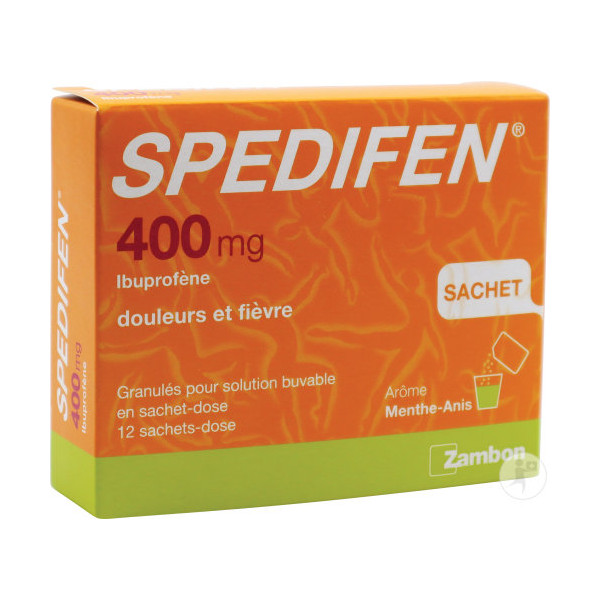Indication
The drug Spedifen 400 Dental Pain contains a non-steroidal anti-inflammatory drug: ibuprofen. Spedifen 400 is indicated in adults and children over 30 kg (approximately 11-12 years), for the short-term treatment of dental pain. It can also be used as part of the treatment of fever and / or pain such as headaches, flu-like symptoms, toothache, body aches, painful periods.
Dosage
SUITABLE FOR ADULTS AND CHILDREN WEIGHING OVER 30 kg (11-12 years).
The usual dosage is 1 tablet at 400 mg per dose, to be repeated if necessary, without exceeding 3 tablets at 400 mg per day (i.e. 1200 mg per day).
The 400 mg tablet is reserved for more intense pain or fever or not relieved by a 200 mg ibuprofen tablet.
Regular intake helps prevent fever or pain peaks. They should be spaced at least 6 hours.
As the elderly are at increased risk of side effects, use the lowest possible dose for the shortest time needed to relieve symptoms.
Do not exceed the recommended doses or the duration of treatment (3 days in case of fever, 5 days in case of pain).
The maximum dosage is 3 tablets per day (1200 mg).
Composition of the drug
The active substance is:
Ibuprofen................................................. .................................................. ....................... 400 mg
For a film-coated tablet.
The other ingredients are:
Arginine, sodium bicarbonate, crospovidone, magnesium stearate, hypromellose, sucrose, titanium dioxide (E171), macrogol 4000.
Precautions for use
At high doses, greater than 1200 mg / day, this drug has anti-inflammatory properties and can cause sometimes serious drawbacks which are those observed with non-steroidal anti-inflammatory drugs. Medicines such as SPEDIFEN 400 mg film-coated tablets may increase the risk of heart attack ("myocardial infarction") or stroke. The risk is all the greater as the doses used are high and the duration of treatment prolonged. Do not exceed the recommended doses or the duration of treatment. If you have heart problems, if you have had a stroke or if you think you have risk factors for this type of pathology (for example if you have high blood pressure, diabetes, high cholesterol or if you smoke), talk to your doctor or pharmacist. The diagnosis and monitoring of migraine attacks in children require medical advice.
Pregnancy and breast feeding
ASK YOUR DOCTOR OR PHARMACIST FOR ADVICE BEFORE TAKING ANY MEDICINAL PRODUCT.
Pregnancy
During the first trimester of pregnancy (12 weeks of amenorrhea, i.e. 12 weeks after the 1st day of your last period), your doctor may prescribe this medicine, if necessary. From 2.5 to 5 months of pregnancy (12 to 24 weeks of amenorrhea), this medication will only be used on the advice of your doctor and in brief. Long-term use of this medication is strongly discouraged. Beyond 5 months of pregnancy (beyond 24 weeks of amenorrhea), you should under NO circumstances take this medication, because its effects on your child may have serious consequences, particularly on a cardiopulmonary level and kidney, even with just one take. If you have taken this medicine when you were more than five months pregnant, please talk to your obstetrician-gynecologist so that you can be offered appropriate monitoring.
Feeding with milk
This medicine passes into breast milk. As a precaution, it should be avoided during breastfeeding.



